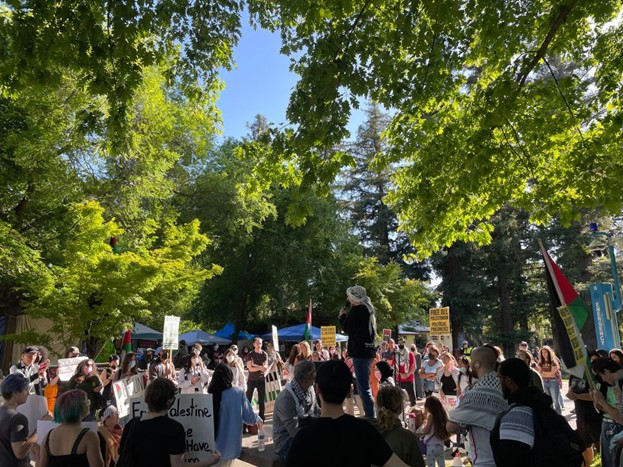Protecting Free Speech and Academic Freedom on Our Campuses
As CFA members, we have fought hard to protect free speech and the free exchange of ideas, and to do so while maintaining safety on our campuses.

Student activists on several CSU campuses have set up encampments, marched across their campuses, and held rallies to bravely demand that our campus administrators divest funds away from any corporations that contribute to escalating violence against vulnerable populations and human rights violations.
On May 9, Sacramento State became the first CSU to divest from Israel-tied investments, and the university updated its policies to meet the demands of student demonstrators.
“Our students are participating in this crucial moment in history by taking a stance for Palestine. We are inspired by their tenacity to be civically engaged. This is an important time and opportunity for us as scholars and educators to learn from and with our students. We are proud of them and firmly support their efforts until their demands are met,” said CFA member and Sacramento State Professor Hanieh Molana.
In a message to students, faculty, and staff, Sacramento State President Luke Wood dispelled the belief that we can only take a binary approach to global issues and conflicts. Instead of pushing students and faculty away, Wood leaned in. He encouraged his administration to offer a safe environment where anyone could engage with and understand the pain and fear our students have been experiencing.
Rather than turning to violent removal or assembling a police presence, Wood created initiatives and efforts to create a safe and welcoming environment for students, including those who identify as Jewish, Palestinian, and their allies. As a result, Sacramento State changed its policies to be more socially responsible, and the encampments dissolved peacefully.
Wood’s sincere approach is very different than the fear-mongering and dangerous approach taken by President Tom Jackson at Cal Poly Humboldt.
Jackson refused to meet any of the students’ demands, which included either amending or removing the Time, Manner, and Place policy, a policy which would allow administrators to call the police on students for organizing in ways they deemed inappropriate. Instead, Jackson called in several local and statewide law enforcement agencies to support the University Police. A combined force of 150 police officers in riot gear assaulted and arrested dozens of students and dismantled their encampments. They claimed these actions were necessary to “restore order” to the campus.
The Humboldt campus has remained closed even after the semester has concluded, and faculty who are required to go onto campus to collect books or other material must be escorted by armed police officers. The university also notified the public that anyone who enters the campus without permission will be faced with citation or arrest.
The modern militarization of police is not coincidental, and it has grown as the number of students and faculty of color have increased on our campuses.
“It’s unbelievable that we have been working towards alternatives to policing and yet we see a wave of intensified policing on our campuses,” said Sharon Elise, CFA Associate Vice President, Racial & Social Justice, South, and CSU San Marcos professor. “By bringing in police, we are only bringing in violence, and Humboldt demonstrated this perfectly. As far as universities go, we need to welcome all kinds of dissent and have dialogue, not more police.”
CFA members have been pursuing alternatives to policing and the demilitarization of policing on our campuses to ensure we adequately protect the wellbeing of our Black and brown, trans, queer, and non-binary faculty and students.
Two years ago, CFA members tried to take a systemic approach to advance the goals of police reform and community well-being by partnering with legislators to pass Assembly Bill 1997. Since its signing into law, a stakeholder workgroup comprised of faculty, staff, and students has been convening to develop alternatives to emergency responses and dispute resolutions that occur on campus.
CSU management claims that the Time, Place, and Manner policies set by different university campuses are intended to carve out the limitations of free speech on campus.
While we understand the importance of creating safe environments for all members of our campus communities, Time, Place, and Manner restrictions have been used to suppress and retaliate against faculty and students. In one instance, a Black student who protested tuition hikes was stalked and surveilled by both administrators and police, had their organizing actions documented and reprimanded, and was ultimately disenrolled from their classes.
In tandem with these policies, Senate Bill 1287, introduced to the Legislature in March, could potentially ban the use of controversial slogans or the ability for students, faculty, and staff to freely express themselves without threat or intimidation from campus administrators. It would also require campus administrators to develop mandatory training programs to “educate” students on how to exchange views.
“This bill is a direct attack on Ethnic Studies and an attempt to stifle the organizing done by our Ethnic Studies professors and students who speak out against injustices,” said Chris Cox, CFA Vice President of Racial & Social Justice, North, and San Jose State lecturer. “There is a big difference between making someone feel uncomfortable and making someone feel unsafe. When you’re in an Ethnic Studies class, you might feel uncomfortable because your beliefs are being challenged, but it is not an unsafe space. Just because people feel uncomfortable on campus doesn’t mean they are unsafe on campus.
“There is certainly a right way to go about this, and it is not one that comes from a place of fear or a desire for control, and that’s what we’ve been seeing on many of our campuses.”
Join California Faculty Association
Join thousands of instructional faculty, librarians, counselors, and coaches to protect academic freedom, faculty rights, safe workplaces, higher education, student learning, and fight for racial and social justice.